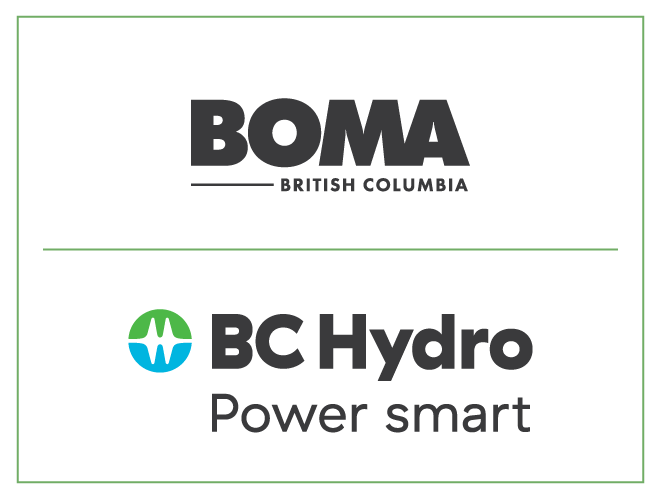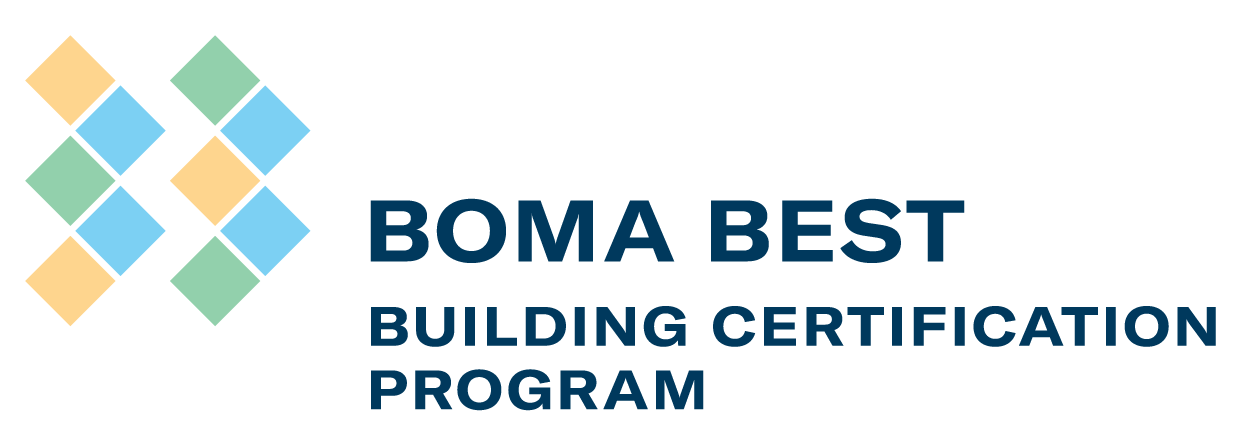
Climate Action
BOMA BC's Climate Action initiative helps the commercial real estate industry reduce its carbon footprint and achieve net-zero emissions through energy efficiency and sustainable practices. The program offers education, resources, and advocacy to support the adoption of green technologies and eco-friendly operations.
Focused on collaboration, it connects members with industry-wide efforts to meet climate goals and regulations. Our efforts aim to create a greener, more resilient built environment while helping members stay competitive and compliant in a changing landscape.

-

BC Hydro Partnership
BOMA BC entered a new two-year contribution agreement with BC Hydro in March 2024, building on the success of our previous partnership that ended in 2023. The 2024 agreement focuses on addressing market gaps in research and tools to advance energy management and decarbonization in commercial real estate.
Key initiatives include developing a Decarbonization Planning Guide, researching ESG programs and platforms, and studying tenant preferences for environmentally conscious buildings. BOMA also conducted a major review of utilities across the province to assess challenges in accessing building energy consumption data. Additional research reports and guides are planned for publication in 2025. BOMA BC’s partnership with BC Hydro has been key to advancing industry knowledge and delivering practical tools.
-

Emissions Reporting
Throughout 2024, BOMA BC actively engaged in consultations with the City of Vancouver as it launched a bylaw requiring mandatory energy and emissions reporting for large commercial buildings. BOMA hosted multiple forums where City representatives shared details on timelines, reporting platforms, and compliance resources while addressing feedback from BOMA Members.
In 2024, only buildings over 100,000 square feet were required to report. In 2025, reporting will expand to include multi-unit residential buildings and properties as small as 50,000 square feet. BOMA will continue working with the City to keep Members informed and prepared for expanded reporting requirements and upcoming GHG emissions limits in 2026.
Natural Resources Canada Deep Retrofit Accelerator Initiative (DRAI)
In 2024, BOMA BC was one of the only commercial recipients in Western Canada to receive funding from Natural Resources Canada to launch an intensive three-year program supporting buildings through decarbonization and deep retrofit planning.
BOMA BC launched the Decarb Accelerator Program in June 2024. Open to office, retail, and light industrial buildings across the province, the program takes a holistic approach to decarbonization, considering property, personnel, and operational factors. BOMA BC Program Managers work directly with each participating building, conducting site visits to inventory systems, identifying operational shortcomings, optimizing mechanical systems, and developing business cases for low-carbon retrofits. The program also provides training and skills development to equip property personnel for market transformation.
By the end of 2024, 19 buildings had joined the program. The goal is to enroll 25 buildings per year, reaching 75 buildings by the program’s completion.
BOMA BC partnered with the Zero Emissions Innovation Centre (ZEIC) and other organizations under the BC Retrofit Accelerator (BCRA), with additional funding from the Ronald S. Roadburg Foundation, Metro Vancouver, and other contributors.

-
Next Steps Forward
The BOMA BC Climate Action Committee met regularly throughout 2024 to review existing programs and explore market and resource gaps for future initiatives.
BOMA BEST® is an international green building certification program launched by BOMA Canada in 2005 to address an industry need for realistic standards for energy and environmental performance of existing buildings based on accurate, independently verified information.
Commercial buildings that are BOMA BEST® certified have a distinct advantage when it comes to attracting and retaining tenants. In most cases, it also costs less to operate and maintain the buildings due to an increase in overall building efficiency.
Program Enhancements:
BOMA BEST® continued to evolve with the planned launch of version 4.1 on January 31, 2025. This update aims to align better with industry needs, simplify the certification process, and include key improvements such as clarified criteria and updated questions.
For more info on the program, visit the BOMA BEST® website.

Certifications
A BOMA BEST Sustainable Buildings certification recognizes excellence in energy and environmental management and performance in commercial real estate.
Managed by BOMA Canada and delivered by the eleven Local BOMA Associations nationwide, BOMA BC Members certified an amazing 64 buildings in 2024 for a total of 13,593,702. sf!
Cadillac Fairview Corp. Ltd. | PricewaterhouseCoopers Place | Gold
BGO | Hillside Centre | Platinum
JLL | 1675 Douglas | Silver
GWL | 555 Robson | Gold
Warrington PCI Management | 800 Burrard | Gold
Epic Investment Services | Gateway Place | Gold
-

Enclosed Shopping
Centre -

Healthcare
Building -

Light
Industrial -

Multi-Unit
Residential -

Office
Building -

Open Air
Retail -

Universal
Building -

Certified Baseline
(30 x In Verification) -

Certified
Bronze -

Certified
Silver -

Gold
Certified -

Certified
Platinum

Climate Action Services + Tools
-

BOMA uTRACK
This cloud-based, software-as-a-service (SaaS) modelled, utility monitoring and analysis platform was developed for BOMA by Prism Engineering. Members can view their properties' energy and water consumption trends utilizing the PUMA, a user-friendly dashboard which displays information according to both usage and costs. As an efficient ‘utility accounting system’, the platform generates numerous detailed reports so that BOMA Members can more effectively ‘tell their energy management story’.
-

BOMA's Total Waste Management Program
Since 2010, this program has provided a one-stop shop for BOMA Members' waste, recycling, and audit solutions. Servicing Whistler to Chilliwack and everywhere in between, the program is a partnership between BOMA BC and Urban Impact, providing total waste management (TWM) solutions for all asset types. In addition to providing your buildings with clear and concise signage for sorting at source, BOMA Members also receive annual waste diversion certificates from Urban Impact to gauge their progress and share their results in reports.
-

BOMA e-Energy Training
Considered the gold standard in energy management courses for building operators and managers of commercial and institutional buildings, BOMA’s e-Energy training is delivered online in a self-learning, self-paced format. The course highlights operational and capital project opportunities. Upon completion, participants become well-versed in basic energy principles, can identify energy reduction opportunities, develop appropriate reduction strategies, and learn how to influence stakeholders to adopt energy-conscious behaviours.
Greater Victoria 2030 District
BOMA BC has proudly hosted the Greater Victoria 2030 District since its launch in 2021. As the second 2030 District in Canada, it is part of a North American network of 24 diverse communities that are accelerating progress toward climate goals for the built environment. Participating property managers, representing a collective portfolio of 618 million square feet, voluntarily commit to reducing energy use and greenhouse gas (GHG) emissions. With an initial 2030 goal of a 50% reduction from a 2007 baseline, participants are now supported to reduce emissions in the entire built environment to reach zero emissions by 2040.
Our Greater Victoria (GV) 2030 District includes the commercial core areas of Victoria and Saanich, as well as satellite commercial and institutional centres across the region. Locally, thirteen property managers are participating, including a diversity of building types, occupancies, ownership and vintage, now totalling 58 buildings and over 4 million square feet of floor space. Since launching, the number of participating buildings has increased by about 50%.
The Greater Victoria 2030 District boundary expanded this year, as the District of Central Saanich was welcomed to the network.
Funding for the GV 2030 District is currently provided by Vancity, City of Victoria, the District of Saanich, the District of Central Saanich, the Real Estate Foundation of BC and MITACS with in-kind support provided by BOMA BC and the University of Victoria.

Services and Products
GV 2030 District members are supported to meet their energy and emissions goals through access to:
Energy benchmark reports, performance monitoring and energy studies to identify opportunities and strategies to meet energy and emission reduction targets.
Expert advisors, a University of Victoria research team and government representatives.
Customized educational webinars and workshops.
A peer support network, including peer case studies, to share knowledge and identify collaboration opportunities.
Featured Initiatives
-

Energy + Emissions Benchmarking
Energy and emissions benchmarking is a critical component of the work of the 2030 District. The progress of participating property managers is measured against a 2007 benchmark, based on the performance of a typical, comparable building. Last year, nine new benchmarking reports were prepared, with more on the way.
-

Performance Tracking
Most buildings in the GV 2030 District are making significant progress and are on track to meet their energy and emissions targets. A dozen have already achieved their annual energy use intensity target at least once; and two-thirds have met their GHG targets, years ahead of schedule.
This work is helping property managers prepare for the rise in benchmarking requirements that will occur across BC, including mandatory benchmarking programs that are being initiated in Saanich and Victoria.
-

Partnering with Building Benchmark BC
The GV 2030 District requires participating buildings to register with Buildings Benchmark BC (BBBC) and use Energy Star Portfolio Manager to track energy use, with the option for public disclosure. BBBC provides data analysis and performance metric support to the GV 2030 District team.
-

Member Meetings and Site Tours
The GV 2030 District hosts quarterly member meetings. Highlights for 2024 included an open-house event at City of Victoria, which led to nine additional pledged buildings; and a tour of Saanich’s Cedar Hill Recreation Centre, highlighting sustainability initiatives such as electric heat pumps and heat recovery systems.
Resiliency Opportunity Assessment & Response (ROAR) Tool
With funding from the Real Estate Foundation of BC and MITACS, the GV 2030 District team continues its partnership with the University of Victoria to develop a resiliency tool for commercial property managers.
The ROAR Tool will enable commercial real estate owners to identify retrofit opportunities to improve building resiliency while meeting energy and GHG emission reduction goals of the 2030 District. An extensive set of climate data is built into the Tool, including downscaled daily precipitation and temperature scenarios from the latest climate modelling, along with associated climate stresses and shocks. The tool evaluates and analyses the operational effects of these stresses and shocks, including both degradation over time from climate stresses and the impact of acute climate shocks. Pilot testing of the Tool with three member properties began in early 2025, with Tool completion planned for later this year.

Case Studies
The GV 2030 District develops case studies profiling member initiatives. The most recent case study features Jawl Properties’ Capital Park investments, including PV installation and conversation to heat pump hot water heaters.
Jawl Cap Park Sanden HP hot water heaters
Sustainability Leadership well-maintained at Capital Park
Capital Park consists of two five-storey buildings at 525 and 545 Superior Street, both of which are LEED Platinum Core and Shell Certified. Significant emission reduction initiatives have been undertaken including converting gas domestic hot water heaters to Sanden CO2 electric heat pump water heaters; and installation of solar photovoltaic (PV) panels and heat recapture systems.
Their conversion from gas-fired hot water tanks to CO2 heat pump water heaters was a smart long-term investment in terms of both operating costs and capital asset management, as well as energy efficiency and GHG reductions. However, transitioning did require nuanced adjustments, attention to tenant needs and nimble use of depreciated assets.
Read more about the sustainability leadership at Capital Park here >
In The News
-

Energy Star Portfolio Manager 10-Year
In 2024, Natural Resources Canada (NRCan) celebrated the 10th anniversary of the Canadian ENERGY STAR Portfolio Manager (ESPM). As part of this milestone, NRCan recognized the contributions of the GV 2030 District, highlighting its pivotal role in helping members use ESPM and supporting them in reducing energy use intensity and greenhouse gas emissions.
-

June 2024 – Business in Vancouver
Collaboration key as network of Victoria buildings leads B.C. in sustainability push.
More than 40 buildings in Greater Victoria promise to cut emissions in half by 2030.
-

June 2024 – Business in Vancouver
Victoria joins New York, Seattle, and others in push to make commercial buildings greener.
The District 2030 Network allows developers to accelerate sustainability.
-

January 2025 – Black Press
Central Saanich joins hub to cut commercial building energy use by 50%.
Property managers can get free guidance to support energy improvements and save money.

















